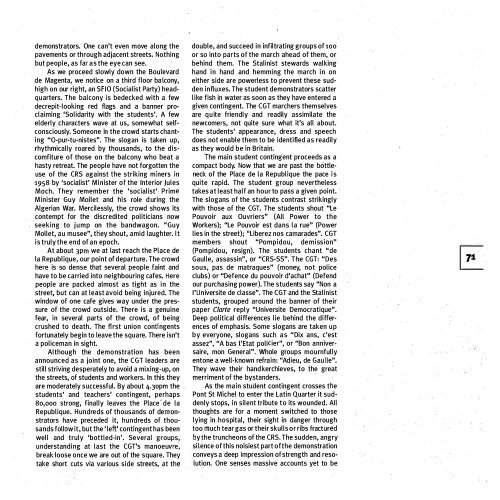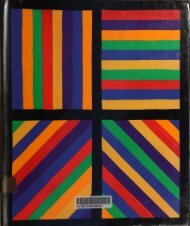SITUATIONISTS AND THE 1£CH MAY 1968
umMYFs
umMYFs
Create successful ePaper yourself
Turn your PDF publications into a flip-book with our unique Google optimized e-Paper software.
demonstrators. One can't even move along the<br />
pavements or through adjacent streets. Nothing<br />
but people, as far as the eye can see.<br />
As we proceed slowly down the Boulevard<br />
de Magenta, we notice on a third floor balcony,<br />
high on our right, an SFIO (Socialist Party) head·<br />
quarters. The balcony is bedecked with a few<br />
decrepit-looking red flags and a banner pro·<br />
claiming 'Solidarity with the students'. A few<br />
elderly characters wave at us, somewhat self·<br />
consciously. Someone in the crowd starts chant·<br />
ing "0-pur-tu·nistes". The slogan is taken up,<br />
rhythmically roared by thousands, to the dis·<br />
comfiture of those on the. balcony who beat a<br />
hasty retreat. The people have not forgotten the<br />
use of the CRS against the striking miners in<br />
1958 by 'socialist' Minister of the Interior Jules<br />
Moch. They remember the 'socialist' Prime<br />
Minister Guy Mollet and his role during the<br />
Algerian War. Mercilessly, the crowd shows its<br />
contempt for the discredited politicians now<br />
seeking to jump on the bandwagon. "Guy<br />
Mollet, au musee", tliey shout, amid laughter. lt<br />
is truly the end of an epoch.<br />
At about 3Pm we at last reach the Place de<br />
la Republique, our point of departure. The crowd<br />
here is so dense that several people faint and<br />
have to be carried into neighbouring cafes. Here<br />
people are packed almost as tight as in the<br />
street, but can at least avoid being injured. The<br />
window of one cafe gives way under the pressure<br />
of the crowd outside. There is a genuine<br />
fear, in several parts of the crowd, of being<br />
crushed to death. The first union contingents<br />
fortunately begin to leave the square. There isn't<br />
a policeman in sight.<br />
Although the demonstration has been<br />
announced as a joint one, the CGT leaders are<br />
still striving desperately to avoid a mixing-up, on<br />
the streets, of students and workers. In this they<br />
are moderately successful. By about 4-3opm the<br />
students' and teachers' contingent, perhaps<br />
8o,ooo strong, finally leaves the Place" de la<br />
Republique. Hundreds of thousands of demon·<br />
strators have preceded it, hundreds of thou·<br />
sands follow it, butthe 'left' contingent has been<br />
well and truly 'bottled-in'. Several groups,<br />
understanding at last the CGT's manoeuvre<br />
break·loose once we are out of the square. They<br />
take short cuts via various side streets, at the<br />
double, and succeed in infiltrating groups of 100<br />
or so into parts of the march ahead of them, or<br />
behind them. The Stalinist stewards walking<br />
hand in hand and hemming the march in on<br />
either side are powerless to prevent these sudden<br />
influxes. The student demonstrators scatter<br />
like fish in water as soon as they have entered a<br />
given contingent. The CGT marchers themselves<br />
are quite friendly and readily assimilate the<br />
newcomers, not quite sure what it's all about.<br />
The students' appearance, dress and speech<br />
does not enable them to be identified as readily<br />
as they would be in Britain.<br />
The main student contingent proceeds as a<br />
compact body. Now that we are past the bottleneck<br />
of the Place de la Republique the pace is<br />
quite rapid. The student group nevertheless<br />
takes at least half an hour to pass a given point.<br />
The slogans of the students contrast strikingly<br />
with those of the CGT. The students shout "le<br />
Pouvoir aux Ouvriers" (All Power to the<br />
Workers); "le Pouvoir est dans la rue" (Power<br />
lies in the street); "liberez nos camarades". CGT<br />
members shout , ; Pompidou, demission"<br />
(Pompidou, resign). The students chant "de<br />
Gaulle, assassin", or "CRS·SS". The CGT: "Des<br />
sous, pas de matraques" (money, not police<br />
clubs) or "Defence du pouvoir d'achat" (Defend<br />
our purchasing power). The students say "Non a<br />
I'Universite de classe". The CGT and the Stalinist<br />
students, grouped around the banner of their<br />
paper Clarte reply "Universite Democratique".<br />
Deep political differences lie behind the differ·<br />
ences of emphasis. Some slogans are taken up<br />
by everyone, slogans such as "Dix ans, c'est<br />
assez", "A bas I'Etat policier", or "Bon anniversaire,<br />
mon General". Whole groups mournfully<br />
entone a well-known refrain: "Adieu, de Gau\le".<br />
They wave their handkerchieves, to the great<br />
·<br />
merriment of the bystanders.<br />
As the main stui:lent contingent crosses tlie<br />
Pont St Michel to enter the Latin Quarter it sud·<br />
denly stops, in silent tribute to its wounded. All<br />
thoughts are for a moment switched to those<br />
lying in hospital, their sight in danger through<br />
too much tear gas or their skulls or ribs fractured<br />
by the truncheons of the CRS. The sudden, angry<br />
silence of this noisiest part of the demonstration<br />
conveys a deep impression of strength and resolution.<br />
One senses massive accounts yet to be<br />
E










